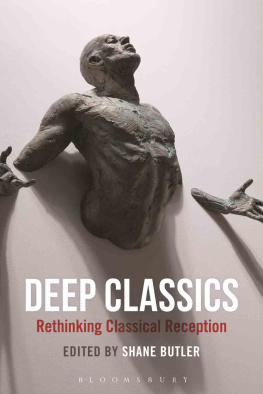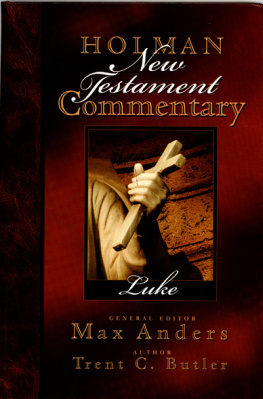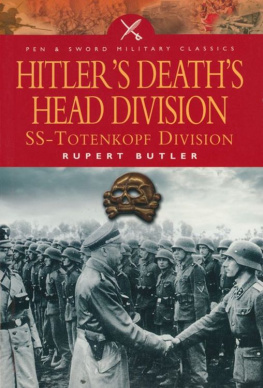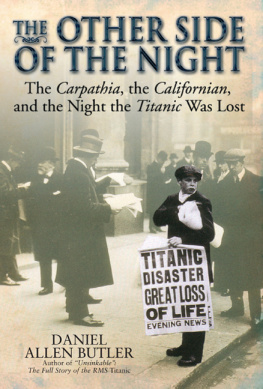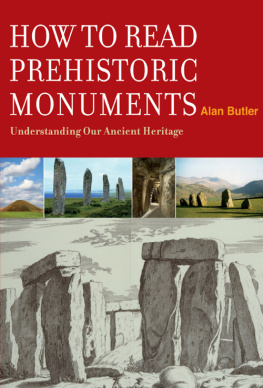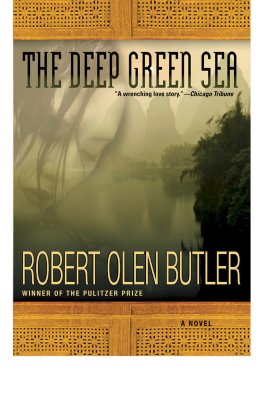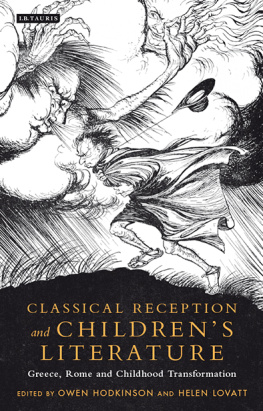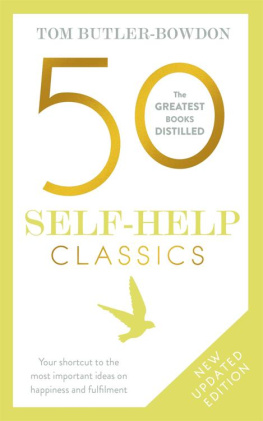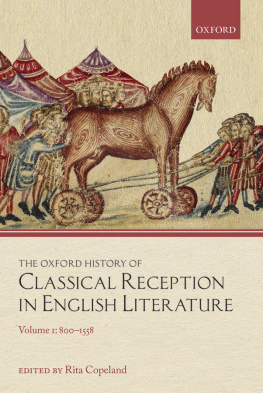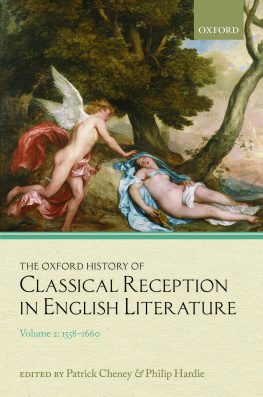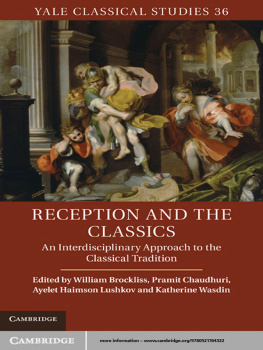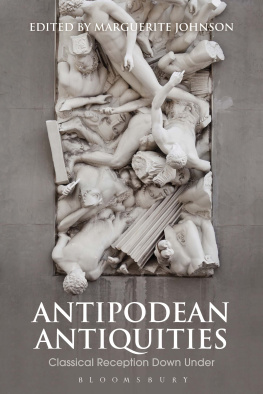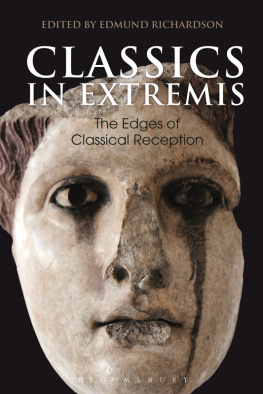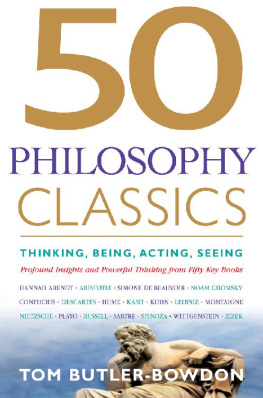Butler - Deep classics: rethinking classical reception
Here you can read online Butler - Deep classics: rethinking classical reception full text of the book (entire story) in english for free. Download pdf and epub, get meaning, cover and reviews about this ebook. City: London, year: 2016, publisher: Bloomsbury UK;Bloomsbury Academic an imprint of Bloomsbury Publishing Plc, genre: Detective and thriller. Description of the work, (preface) as well as reviews are available. Best literature library LitArk.com created for fans of good reading and offers a wide selection of genres:
Romance novel
Science fiction
Adventure
Detective
Science
History
Home and family
Prose
Art
Politics
Computer
Non-fiction
Religion
Business
Children
Humor
Choose a favorite category and find really read worthwhile books. Enjoy immersion in the world of imagination, feel the emotions of the characters or learn something new for yourself, make an fascinating discovery.
- Book:Deep classics: rethinking classical reception
- Author:
- Publisher:Bloomsbury UK;Bloomsbury Academic an imprint of Bloomsbury Publishing Plc
- Genre:
- Year:2016
- City:London
- Rating:3 / 5
- Favourites:Add to favourites
- Your mark:
- 60
- 1
- 2
- 3
- 4
- 5
Deep classics: rethinking classical reception: summary, description and annotation
We offer to read an annotation, description, summary or preface (depends on what the author of the book "Deep classics: rethinking classical reception" wrote himself). If you haven't found the necessary information about the book — write in the comments, we will try to find it.
Deep classics: rethinking classical reception — read online for free the complete book (whole text) full work
Below is the text of the book, divided by pages. System saving the place of the last page read, allows you to conveniently read the book "Deep classics: rethinking classical reception" online for free, without having to search again every time where you left off. Put a bookmark, and you can go to the page where you finished reading at any time.
Font size:
Interval:
Bookmark:
Also available from Bloomsbury
Ancient Magic and the Supernatural in the Modern Visual and Performing Arts, edited by Filippo Carl and Irene Berti
Greek and Roman Classics in the British Struggle for Social Change, edited by Henry Stead and Edith Hall
Imagining Xerxes, Emma Bridges
Ovids Myth of Pygmalion on Screen, Paula James
Seduction and Power: Antiquity in the Visual and Performing Arts, edited by Silke Knippschild and Marta Garca Morcillo
Victorian Classical Burlesques: A Critical Anthology, Laura Monros-Gaspar
War as Spectacle: Ancient and Modern Perspectives on the Display of Armed Conflict, edited by Anastasia Bakogianni and Valerie M. Hope

Shane Butler
Shane Butler
Joshua Billings
Alex Purves
Helen Slaney
Joshua T. Katz
Adam Lecznar
Sarah Nooter
Stephanie Ann Frampton
Sebastian Matzner
Giulia Sissa
Edmund Richardson
Mark Payne
Davide Susanetti
Brooke Holmes
Laura Jansen
A conversation with Pantelis Michelakis gave Deep Classics its initial impetus, and the original request for conference funding from the Institute of Greece, Rome and the Classical Tradition (IGRCT) at the University of Bristol was drafted with the help of Vanda Zajko. Robert Fowler, then director of the IGRCT, immediately became and has remained a champion of the project; so too has much encouragement and support come from Beth Williamson, Bristols Deputy Head of Research for the School of Humanities. The original conference would never have been possible without the heroic efforts of IGRCT Co-ordinator Sam Barlow, as well as those of interns Rhiannon Easterbrook and Jessica Romney. Further help along the way was provided by Shelley Hales, Laura Jansen and Adam Lecznar. Warm thanks also to Nora Goldschmidt and Luke Richardson, whose stimulating papers at the conference belonged to other projects that will see publication elsewhere. Alice Wright of Bloomsbury attended the conference from start to finish (though an early train back to London deprived her of her dinner!) and deftly has guided this volume through publication. Image and other publication costs have partially been defrayed by additional support from the IGRCT. At Johns Hopkins, Michele Asuni has helped to bring bibligraphic and citational order to the ensemble, and Earl Havens and Paul Espinosa helped with images. Further adjustments and polish have been provided by the production team at Bloomsbury. The editors deepest thanks go to this volumes contributors, who took up this topic with enthusiasm and imagination, and whose speedy revisions, in close contact with one another, have made the timely publication of this remarkable collaborative effort possible. Additional thanks by contributors can be found in the notes to their single chapters. The editors own efforts are dedicated to Leonardo Proietti.
Joshua Billings is Assistant Professor of Classics at Princeton University and author of Genealogy of the Tragic: Greek Tragedy and German Philosophy (2014).
Shane Butler held the Chair of Latin at the University of Bristol and is now Professor of Classics at Johns Hopkins University. His most recent book is The Ancient Phonograph (2015).
Stephanie Ann Frampton is Assistant Professor of Classical Literature at the Massachussetts Institute of Technology. Her first book, Alphabetic Order: Writing in Roman Literature and Thought, will appear soon.
Brooke Holmes is Professor of Classics at Princeton University. Her books include The Symptom and the Subject: The Emergence of the Physical Body in Ancient Greece (2010) and Gender: Antiquity and Its Legacy (2012).
Laura Jansen is Lecturer in Latin Language and Literature at the University of Bristol and editor of The Roman Paratext: Frames, Texts, Readers (2014). She currently is working on a book titled Borges Classics.
Joshua T. Katz is Professor of Classics and member of the Program in Linguistics at Princeton University. He is the author of numerous articles on the languages, literatures and cultures of the ancient world, broadly conceived.
Adam Lecznar is the A.G. Leventis Fellow in Greek Studies at the University of Bristol. He is working currently on a book on the understanding of Dionysus and Greek tragedy in the wake of Nietzsche.
Sebastian Matzner is Lecturer in Comparative Literature at Kings College London. His first book, Rethinking Metonymy: Literary Theory and Poetic Practice from Pindar to Jakobson, will appear soon.
Sarah Nooter is Associate Professor of Classics at the University of Chicago and author of When Heroes Sing: Sophocles and the Shifting Soundscape of Tragedy (2012).
Mark Payne is Professor of Classics and in the John U. Nef Committee on Social Thought at the University of Chicago. His most recent book is The Animal Part: Human and Other Animals in the Poetic Imagination (2010).
Alex Purves is Associate Professor of Classics at UCLA and author of Space and Time in Ancient Greek Narrative (2010).
Edmund Richardson is Lecturer in Classics at Durham University and author of Classical Victorians: Scholars, Scoundrels and Generals in Pursuit of Antiquity. He is currently working on the afterlives of Alexander the Great and his cities.
Giulia Sissa is Professor of Political Science and of Classics at UCLA. Her most recent book is La jalousie: Une passion inavouable (2015).
Helen Slaney holds a British Academy Postdoctoral Fellowship in Classics at St Hildas College, Oxford, and is the author of The Senecan Aesthetic: A Performance History (2015).
Davide Susanetti is Associate Professor in the Dipartimento di Studi Linguistici e Letterari at the University of Padova. His most recent book is Atene post-occidentale: Spettri antichi per la democrazia contemporanea (2014).
Shane Butler
stratigraphy, from early to late, unless you flip the book over, where the jacket of one edition suggestively borrows the very quote with which I began. We may well judge books by their covers, but to read them we must eventually open them up from the side. Accordingly, Manguels invitation to read takes us into the thickly layered history of Homeric reading laterally. Though he may encourage us to explore each seam separately and for its own sake, his books very existence suggests that these add up to a lesson more profound than that which any of them could offer singly.
Part of that lesson, to be sure, is a rather old-school one about the endless fecundity of the Homeric poems themselves. Pointedly aimed at a general readership, in a series titled Books That Shook the World, Manguels book partly offers the kind of celebration of
Between tradition and reception, however, Manguels geological simile hints at a third perspective irreducible to either. It will be the contention of the present book that this tertium quid, to which we have assigned the name of Deep Classics, offers us, if not an entirely new way forward, then at least a new way of contextualizing some of what we all seem to have been doing, all along. To better understand what this might be, and to explain the reason for the name, let us briefly consider a superficially similar point of view, directed at actual layers of real rock. In the following, John describes their 1788 excursion to the base of a soaring cliff on the Scottish coast, where Huttons theories of the complex interaction between igneous and sedimentary rock met with dramatic visual confirmation:
Next pageFont size:
Interval:
Bookmark:
Similar books «Deep classics: rethinking classical reception»
Look at similar books to Deep classics: rethinking classical reception. We have selected literature similar in name and meaning in the hope of providing readers with more options to find new, interesting, not yet read works.
Discussion, reviews of the book Deep classics: rethinking classical reception and just readers' own opinions. Leave your comments, write what you think about the work, its meaning or the main characters. Specify what exactly you liked and what you didn't like, and why you think so.

